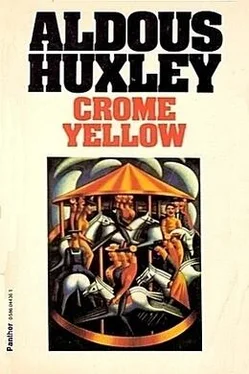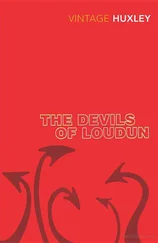"Are they?"
"One may become a nymphomaniac if one's not careful. You've no idea how serious these repressions are if you don't get rid of them in time."
"It sounds too awful," said Anne. "But I don't see that I can do anything to help you."
"I thought I'd just like to talk it over with you."
"Why, of course; I'm only too happy, Mary darling."
Mary coughed and drew a deep breath. "I presume," she began sententiously, "I presume we may take for granted that an intelligent young woman of twenty–three who has lived in civilised society in the twentieth century has no prejudices."
"Well, I confess I still have a few."
"But not about repressions."
"No, not many about repressions; that's true."
"Or, rather, about getting rid of repressions."
"Exactly."
"So much for our fundamental postulate," said Mary. Solemnity was expressed in every feature of her round young face, radiated from her large blue eyes. "We come next to the desirability of possessing experience. I hope we are agreed that knowledge is desirable and that ignorance is undesirable."
Obedient as one of those complaisant disciples from whom Socrates could get whatever answer he chose, Anne gave her assent to this proposition.
"And we are equally agreed, I hope, that marriage is what it is."
"It is."
"Good!" said Mary. "And repressions being what they are…"
"Exactly."
"There would therefore seem to be only one conclusion."
"But I knew that," Anne exclaimed, "before you began."
"Yes, but now it's been proved," said Mary. "One must do things logically. The question is now…"
"But where does the question come in? You've reached your only possible conclusion—logically, which is more than I could have done. All that remains is to impart the information to someone you like—someone you like really rather a lot, someone you're in love with, if I may express myself so baldly."
"But that's just where the question comes in," Mary exclaimed. "I'm not in love with anybody."
"Then, if I were you, I should wait till you are."
"But I can't go on dreaming night after night that I'm falling down a well. It's too dangerous."
"Well, if it really is TOO dangerous, then of course you must do something about it; you must find somebody else."
"But who?" A thoughtful frown puckered Mary's brow. "It must be somebody intelligent, somebody with intellectual interests that I can share. And it must be somebody with a proper respect for women, somebody who's prepared to talk seriously about his work and his ideas and about my work and my ideas. It isn't, as you see, at all easy to find the right person."
"Well" said Anne, "there are three unattached and intelligent men in the house at the present time. There's Mr. Scogan, to begin with; but perhaps he's rather too much of a genuine antique. And there are Gombauld and Denis. Shall we say that the choice is limited to the last two?"
Mary nodded. "I think we had better," she said, and then hesitated, with a certain air of embarrassment.
"What is it?"
"I was wondering," said Mary, with a gasp, "whether they really were unattached. I thought that perhaps you might…you might…"
"It was very nice of you to think of me, Mary darling," said Anne, smiling the tight cat's smile. "But as far as I'm concerned, they are both entirely unattached."
"I'm very glad of that," said Mary, looking relieved. "We are now confronted with the question: Which of the two?"
"I can give no advice. It's a matter for your taste."
"It's not a matter of my taste," Mary pronounced, "but of their merits. We must weigh them and consider them carefully and dispassionately."
"You must do the weighing yourself," said Anne; there was still the trace of a smile at the corners of her mouth and round the half–closed eyes. "I won't run the risk of advising you wrongly."
"Gombauld has more talent," Mary began, "but he is less civilised than Denis." Mary's pronunciation of "civilised" gave the word a special and additional significance. She uttered it meticulously, in the very front of her mouth, hissing delicately on the opening sibilant. So few people were civilised, and they, like the first–rate works of art, were mostly French. "Civilisation is most important, don't you think?"
Anne held up her hand. "I won't advise," she said. "You must make the decision."
"Gombauld's family," Mary went on reflectively, "comes from Marseilles. Rather a dangerous heredity, when one thinks of the Latin attitude towards women. But then, I sometimes wonder whether Denis is altogether serious–minded, whether he isn't rather a dilettante. It's very difficult. What do you think?"
"I'm not listening," said Anne. "I refuse to take any responsibility."
Mary sighed. "Well," she said, "I think I had better go to bed and think about it."
"Carefully and dispassionately," said Anne.
At the door Mary turned round. "Good–night," she said, and wondered as she said the words why Anne was smiling in that curious way. It was probably nothing, she reflected. Anne often smiled for no apparent reason; it was probably just a habit. "I hope I shan't dream of falling down wells again to–night," she added.
"Ladders are worse," said Anne.
Mary nodded. "Yes, ladders are much graver."
Breakfast on Sunday morning was an hour later than on week–days, and Priscilla, who usually made no public appearance before luncheon, honoured it by her presence. Dressed in black silk, with a ruby cross as well as her customary string of pearls round her neck, she presided. An enormous Sunday paper concealed all but the extreme pinnacle of her coiffure from the outer world.
"I see Surrey has won," she said, with her mouth full, "by four wickets. The sun is in Leo: that would account for it!"
"Splendid game, cricket," remarked Mr. Barbecue–Smith heartily to no one in particular; "so thoroughly English."
Jenny, who was sitting next to him, woke up suddenly with a start. "What?" she said. "What?"
"So English," repeated Mr. Barbecue–Smith.
Jenny looked at him, surprised. "English? Of course I am."
He was beginning to explain, when Mrs. Wimbush vailed her Sunday paper, and appeared, a square, mauve–powdered face in the midst of orange splendours. "I see there's a new series of articles on the next world just beginning," she said to Mr. Barbecue–Smith. "This one's called 'Summer Land and Gehenna.'"
"Summer Land," echoed Mr. Barbecue–Smith, closing his eyes. "Summer Land. A beautiful name. Beautiful—beautiful."
Mary had taken the seat next to Denis's. After a night of careful consideration she had decided on Denis. He might have less talent than Gombauld, he might be a little lacking in seriousness, but somehow he was safer.
"Are you writing much poetry here in the country?" she asked, with a bright gravity.
"None," said Denis curtly. "I haven't brought my typewriter."
"But do you mean to say you can't write without a typewriter?"
Denis shook his head. He hated talking at breakfast, and, besides, he wanted to hear what Mr. Scogan was saying at the other end of the table.
"…My scheme for dealing with the Church," Mr. Scogan was saying, "is beautifully simple. At the present time the Anglican clergy wear their collars the wrong way round. I would compel them to wear, not only their collars, but all their clothes, turned back to frantic—coat, waistcoat, trousers, boots—so that every clergyman should present to the world a smooth facade, unbroken by stud, button, or lace. The enforcement of such a livery would act as a wholesome deterrent to those intending to enter the Church. At the same time it would enormously enhance, what Archbishop Laud so rightly insisted on, the 'beauty of holiness' in the few incorrigibles who could not be deterred."
Читать дальше











